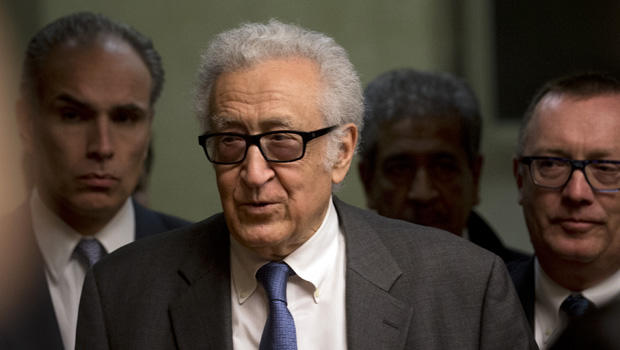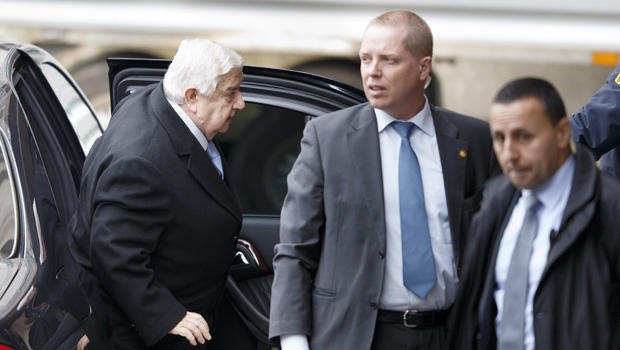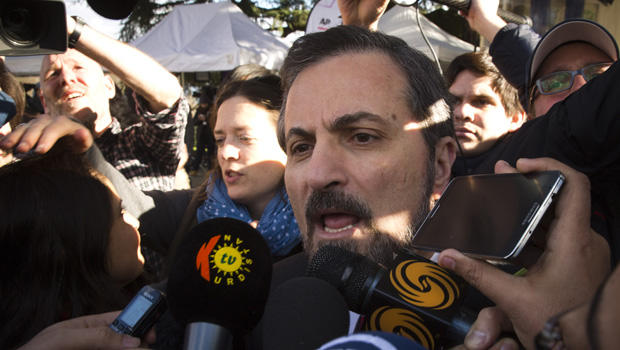U.N. mediator says Syria talks accomplished little but will continue
GENEVA -- The second face-to-face meeting between Syria's government and the opposition ended on Saturday with only a pledge from both sides to work on a cease-fire in the city of Homs, U.N. mediator Lakhdar Brahimi said.
“We have not achieved much in the two sets of talks we had today in the morning and in the afternoon but we will continue over the coming days," Brahimi told reporters. "We have not accomplished an agreement but we discussed the prospect of reaching a ceasefire in the old city of Homs."
“The governor of Homs is going to make contacts tomorrow and we are hoping that on Monday humanitarian assistance, food and medicine, will get into old Homs,” he added.
Syria's third-largest city, Homs, became a major center of resistance and reprisal early on in the uprising, CBS News' George Baghdadi reports. Neighborhoods in the old city have been ravaged following repeated government assaults to reclaim control from rebels and most of its pre-war population of 1 million has fled.
The opposition said fighters in Homs - where only a few parts of the Old City remain in rebel hands - had agreed to abide by any agreements reached in Geneva.
A Syrian official said in response to Brahimi's statement that the government delegation was not aiming for a temporary ceasefire.
“The Syrian delegation has come to Geneva because it is seeking a genuine solution to all political, security, humanitarian and social problems, not to reach a temporary ceasefire that would last for a few days in a small area,” the Syrian official said.
“We cannot start with humanitarian issues before solving security problems and arrangements on the ground," the official said. "Snipers, explosives and mortar shells usually target assistance convoys. We demanded Brahimi to work on fighting terrorism all over the country.”
Brahimi, who acted as a buffer between the two sides, said
the painstakingly choreographed conference would continue Sunday. It will focus
on humanitarian aid - the one topic the Syrian government and the opposition
could agree to discuss – and consider prisoners and hostages in the hopes of achieving their release.
On Saturday, sitting face to face at a U-shaped table and separated by Brahimi, President Bashar Assad's delegation and the Syrian National Coalition avoided directly touching on the war dividing them - or discussing Assad himself.
They entered by separate doors and said they would speak only to Brahimi, and not to each other.
"One is on the left and one on right and they face one another and they talk to each other - through me, to one another," he said. "This is what happens in civilized discussions."
The peace conference intended to forge a path out of the civil war that has killed 130,000 people has been on the verge of collapse since it was first conceived 18 months ago. On Saturday, the talks avoided the main issue of Assad's future, with both sides appearing to soften their approach after days of escalating rhetoric.
The coalition agreed to the Geneva talks only if the focus was on an end to the Assad dynasty, while the Damascus contingent zeroed in on fighting terrorism -- disputing any claims that it had agreed to the talks' stated goal of a transitional government.
Louay Safi, of the coalition, described the talks as "consultations - it's not negotiations."
"It was not easy for us to sit with the delegation that represents the killers in Damascus, but we did it for the sake of the Syrian people and for the sake of the Syrian children," said Anas al-Abdeh, who was among the coalition's representatives. He said everyone remained calm during the first brief meeting at which only Brahimi spoke.
Diplomats have said even getting them to the same table can be considered an accomplishment three years into the uprising.
First on the agenda was the cease-fire in Homs. Brahimi said there was no firm agreement -- local officials also needed to be involved -- but he hoped for a delivery to Homs by Monday.
The city was one of the first areas that plunged into armed conflict in 2011 after Assad responded to largely peaceful protests by unleashing the military. A quarter of the country's population has been displaced, taking refuge from the fighting in camps across the borders or within Syria. Meanwhile, a homegrown rebellion has transformed into a regional proxy war between Iran and Saudi Arabia, with foreign fighters flooding in on both sides.
Russia and the U.S. have taken opposite sides in the war, with Moscow selling Assad military hardware and using its influence on the U.N. Security Council, where as a permanent member it has a veto. Washington has hesitated to send weapons, fearing they will fall into the hands of al Qaeda-inspired militants who dominate some factions of the rebellion.
Complicating any truce efforts, a medley of rebel groups fight from Homs and nearby opposition-held areas, ranging from al Qaeda hardline extremists to conservative Muslim brigades, to the more secular fighters of the Free Syrian Army. They are mostly holed up in or near the old city.
By Saturday afternoon, there was no sign of violence halting in Homs, nor had humanitarian aid entered rebel-held areas blockaded by Assad-loyal forces, said a Homs-based activist and Rami Abdurrahman of the Britain-based Syrian Observatory for Human Rights. The activist identified himself by pseudonym, Firas Homsi, as is typical for those who fear reprisal.
Homsi said there were about 800 Syrian families still in the old city, under blockade for the past 20 months.
"Our situation here is very bad. There's no food and we are using outdated medicine," said Homsi, who had heard rumors of a truce, but saw no evidence of it.
Assad's forces and -- to a lesser extent -- rebel groups have blockaded enemy areas, harshly punishing the poorest and most vulnerable civilians for the gunmen in their midst.


